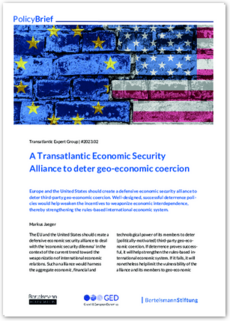Europe and the United States should create a defensive economic security alliance to deter third-party geo-economic coercion. Well-designed, successful deterrence policies would help weaken the incentives to weaponize economic interdependence, thereby strengthening the rules-based international economic system. This is the argument put forward by Markus Jaeger, research fellow at DGAP (German Council on Foreign Relations) and an adjunct professor at Columbia University in New York, in this policy brief.
According to the author, the EU and the United States should create a defensive economic security alliance to deal with the ‘economic security dilemma’ in the context of the current trend toward the weaponization of international economic relations. Such an alliance would harness the aggregate economic, financial and technological power of its members to deter third-party geo-economic (politically-motivated) coercion. If deterrence proves successful, it will help strengthen the rules-based international economic system. If it fails, it will nonetheless help limit the vulnerability of the alliance and its members to geo-economic coercion, while increasing the costs to potential coercers.
The policy brief is a publication of the Transatlantic Expert Group set up by the Bertelsmann Stiftung and the Bertelsmann Foundation in Washington, D.C.







